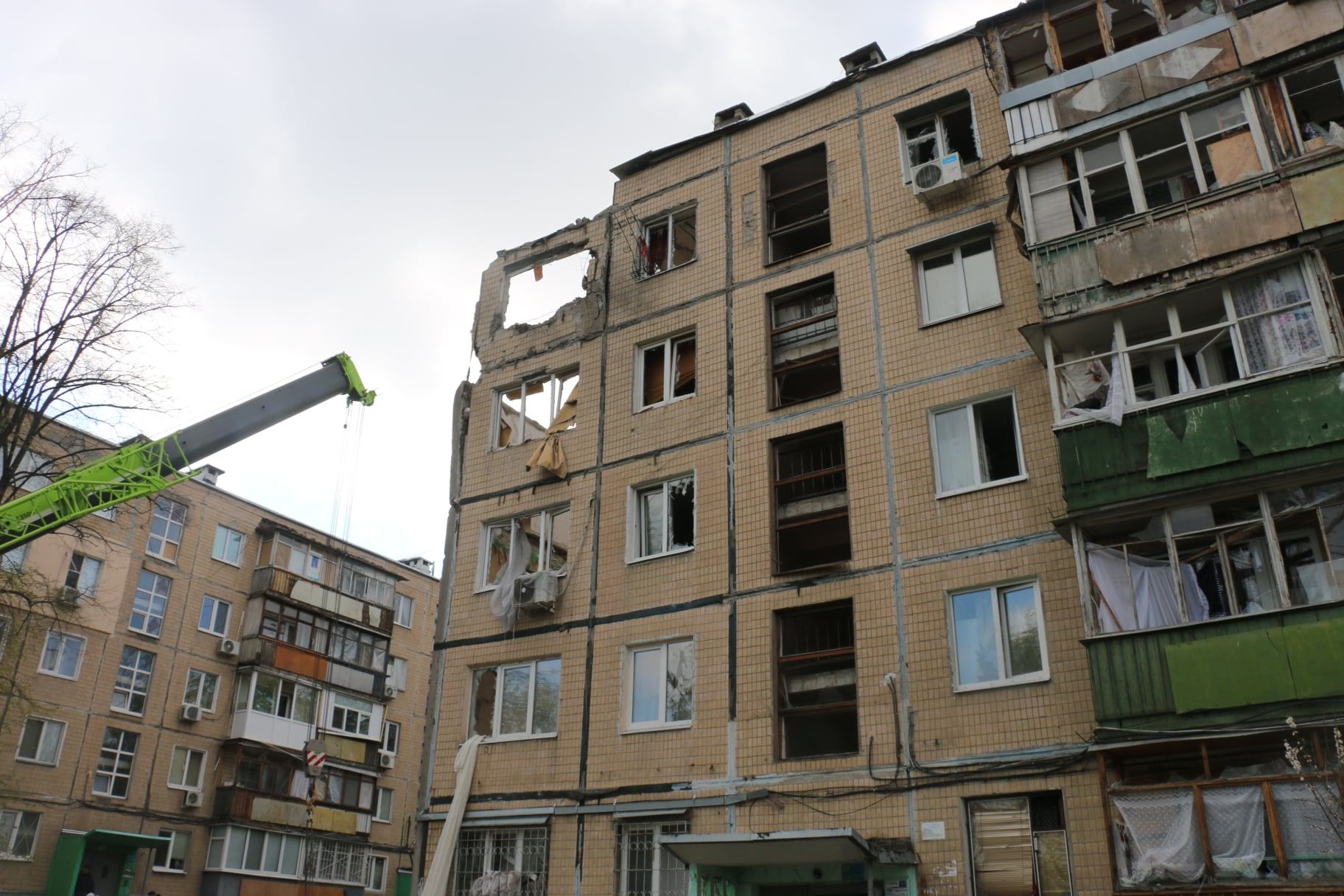By Serhiy Petrov
Today, the total number of attacks by muscovites increased slightly. Saltivka and northern suburbs of the city were shelled the most. It’s calm in the city overall.
It is difficult to outline a pattern, because the shelling was consistent throughout the day. The ruscists mostly fired upon various parts of Saltivka. The northern outskirts of the city were also shelled, including Pyatykhatky, Oleksiyivka, Obriy, the Kharkiv Tractor Plant neighborhood, and Novi Budynky. Unfortunately, there are damaged houses, dead, and wounded. In Selyshche Zhukovskoho, the muscovites again dropped mines with delayed detonation. Bomb technicians neutralized them over the course of the day.

The northern suburbs that were shelled include Derhachi, Slatyne, Prudyanka, as well as other settlements of the Derhachi Hromada. According to local authorities, two people were killed and the number of wounded is being clarified. The gas supply system was damaged in one part of the Derhachi Hromada, leaving more than 10 settlements without gas. Chuhuiv and settlements of the Chuhuiv district were also shelled. Two people were injured in the afternoon in Chuhuiv; it came to light in the evening that a 14-year-old child was injured.
Our servicemen captured five occupiers near Kharkiv. It’s always good to keep an exchange fund going.
The situation in the city is generally stable. Finally, because there’s no work, more and more people are waiting in lines to get humanitarian aid. The situation is most difficult in the areas where shops and markets are destroyed, and where there’s no electricity and gas: Obriy and part of the Kharkiv Tractor Plant neighborhood, for example. Volunteers deliver humanitarian aid there. Saltivka is increasingly divided into areas of absolute desolation, like Pivnichna Saltivka and several neighborhoods of the numbered part of Saltivka, and areas where people continue to live a more or less peaceful life. The people who are staying in the desolate part of Saltivka solely depend on volunteers and the police, who bring them humanitarian aid. As I’ve said before, unwillingness to leave has become a sort of a mantra for some people.
On the 63rd day of the war, the city’s mayor, Igor Terekhov, finally acknowledged that a decolonization of Kharkiv was necessary. That means getting rid of all the names associated with muscovite geographic locations and public figures. Many Kharkiv residents had already lost all hope of hearing such a statement any time soon. It’s well known that (Former Kharkiv Mayor Hennadiy) Kernes and Terekhov have been fighting to bring back Zhukov Avenue’s original name since 2019. (It was renamed to Petro Hryhorenko Avenue in 2016.) They have refused to demolish the monument to Zhukov, which was slated to be dismantled in 2016. However, reality is relentless. Unfortunately, it took the city being shelled for 63 days straight to clear the brain.
In fact the Kharkiv Toponymic Group community and the Northeastern Department of the Ukrainian Institute of National Memory are already conducting an inventory of toponyms that need to be replaced and working on clear criteria for doing so, in the absence of an actual law defining such a framework. I’ll say one thing: toponymics is an applied science that has its own rules and regulations, including regulation by law. Specialists should prepare the final versions of the new names in a way that minimizes conflict (which is unavoidable) and doesn’t let things reach a point of absurdity (such as the renaming of Repin Street in Ivano-Frankivsk or some proposals in Kyiv, which infuriated anyone who bothered to read about the people on Wikipedia.)
Elsewhere in the region, the situation is difficult. The muscovites are attacking in the Slovyansk and Barvinkove directions. They are more active in the Barvinkove direction, trying to cut off the railway leading to Slovyansk and Kramatorsk. Very heavy fighting is taking place on several roads in the Barvinkove direction. Every day for two weeks Barvinkove has been shelled. By the way, the chief of staff of moscovia, Valery Gerasimov, personally commands the offensive in these directions. If you have someone of that rank commanding one of the directions of the operation, the situation is either a complete mess or on the verge of failure. Meanwhile, Gerasimov has already arrived in the Izium area.
In the occupied territories of the Kharkiv region, men are being mobilized or persuaded to cooperate with the occupiers. At the same time, the occupiers carefully look for tattoos or any pro-Ukrainian symbols. They also distribute their own press. (The rag is called “Kharkov Z.”) This is all to say that Kharkiv remains a target for the muscovites. Kharkiv will be next in line after the Donbass operation, so our task is to grind them up as much as possible there and prevent them from achieving their goals in this area. Yes, their press is talking about “successes” in the occupied territories, including interviews with collaborators and all that. Muscovite radio is broadcasting on local stations.
Many schools in the Borova Hromada, which is under temporary occupation, were destroyed, damaged, and looted. Schools in the villages og Gorokhovatka and Iziumske were completely destroyed. In other villages, particularly the village Borova, schools were looted and damaged.
The situation in occupied Izium is complicated. There are still 10,000 to 12,000 people left there, but the remaining food inventory is very low and the prices are cosmic. The muscovites offer to work clearing the rubble left of destroyed houses in exchange for food rations, but people refuse to do that.
According to Izium City Council officials, one of the council employees, Viktor Belskyi, who was a member of a sabotage group from Izium that attacked a ruscist checkpoint, was killed in Izium. At this checkpoint, men were being abducted and women were forced to undress. Dozens of muscovites were killed during the operation. Viktor Belskyi was killed while providing cover for the group’s retreat.
Heavy fighting continues in the Joint Forces Operation zone in Lyman, Rubizhne, Sievierodonetsk, Popasna, Avdiivka, Maryinka, Velyka Novosilka, and the direction of Huliaipole. The muscovites have advanced two kilometers in some places, which came at the cost of completely destroying and burning down the territory.
Mariupol continues to be bombarded and fired from all over. The situation in Azovstal’s shelters is frankly critical, because there is a shortage of water and many wounded remaining in unsanitary conditions.
A rally in support of Ukraine and against the pseudo-referendum and the creation of the People’s Republic of Kherson took place in Kherson today. The occupiers dispersed people with stun grenades and four people were injured. In the evening there was an explosion near the TV tower in Kherson followed by the disappearance of ruscist broadcasts. Immediately, however, a muscovite camera crew appeared, showing inexplicable shell fragments and no damage to the surrounding area. This video was shot… you guessed it, before the badaboom in Kherson even happened, in the best ruscist traditions.
The mobilization campaign in the Kherson region failed. Instead, men were abducted and taken to the Crimea as hostages, to be exchanged for muscovite POWs. Therefore, capturing prisoners is important—because it will help free our POWs and civilian hostages.
Grain is being exported en masse from the Kherson region. The request was made by the Krasnoyarsk Regional Duma, which called it “expropriation of surpluses,” because the western sanctions imposed on moscovia have led to shortages of food, such as vegetables, for example. Supposedly, this “expropriation” (looting) should stabilize the food situation in moscovia. This year marks the 90th anniversary of Holodomor, a genocide of Ukrainians perpetrated by muscovites in 1932-1933. Nothing has changed over the 90 years that have passed since then. They are using the same methods, the same terminology. It was also called “expropriation of surpluses” from the peasants then, with the corresponding consequence being famine in the villages.
Things are restless in moscovia. First, there was a “bang” in Kursk and Voronezh. Voronezh authorities have generally stated that a drone was shot down by air defense forces. Secondly, in the village Saraya Nelidovka, Belhorod region, there were loud “claps.” A warehouse with ammunition appears to have been detonated. It could not be more joyful.
Now some funny stuff. In the villages of the Belhorod region bordering Ukraine, the local authorities organized squads of militiamen and handed them bulletproof vests and metal helmets. The sight of dudes wearing armor and Soviet-era metal helmets in combination with sweatpants and sneakers is magical.
In Stary Oskol (Belhorod region) the authorities were so frightened that they packed a helicopter full of officials and Russian Orthodox Church priests. With them, the priests took icons, incense, and prayers in order to “protect” the city from the “clapping.” It is mentioned that the cruiser Moskva was also guarded by relics. The “defense” did not work, and the ship sank thanks to two Ukrainian “Neptunes.”
Today’s Darwin Award goes to:
- The two muscovite occupiers who carried out an operation to “liberate” a house from the extras, stealing a pot and a backpack. Meanwhile, their faces and actions were recorded by surveillance cameras. The award must find the heroes, including on Myrotvorets.
- The military recruitment office in Ufa, whose nature was once again summed up by low-quality paint that faded from being exposed to air and turned the muscovite tricolor on a banner about conscription into a faint blue and yellow. This must have been another act of sabotage by Ukrainian or other foreign agents. The truth is, muscovites are crooked-handed, unable to produce high-quality, solid goods. Making things on the cheap while stealing money is the norm.
Let us believe in and support our military! We will definitely win!






